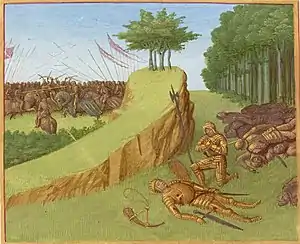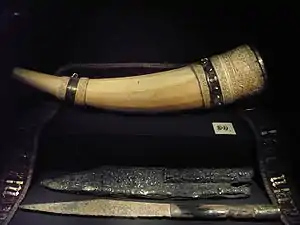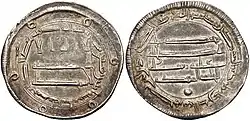778
Year 778 (DCCLXXVIII) was a common year starting on Thursday of the Julian calendar. The denomination 778 for this year has been used since the early medieval period, when the Anno Domini calendar era became the prevalent method in Europe for naming years.
| Millennium: | 1st millennium |
|---|---|
| Centuries: | |
| Decades: | |
| Years: |
| 778 by topic |
|---|
| Leaders |
|
| Categories |
|
| Gregorian calendar | 778 DCCLXXVIII |
| Ab urbe condita | 1531 |
| Armenian calendar | 227 ԹՎ ՄԻԷ |
| Assyrian calendar | 5528 |
| Balinese saka calendar | 699–700 |
| Bengali calendar | 185 |
| Berber calendar | 1728 |
| Buddhist calendar | 1322 |
| Burmese calendar | 140 |
| Byzantine calendar | 6286–6287 |
| Chinese calendar | 丁巳年 (Fire Snake) 3474 or 3414 — to — 戊午年 (Earth Horse) 3475 or 3415 |
| Coptic calendar | 494–495 |
| Discordian calendar | 1944 |
| Ethiopian calendar | 770–771 |
| Hebrew calendar | 4538–4539 |
| Hindu calendars | |
| - Vikram Samvat | 834–835 |
| - Shaka Samvat | 699–700 |
| - Kali Yuga | 3878–3879 |
| Holocene calendar | 10778 |
| Iranian calendar | 156–157 |
| Islamic calendar | 161–162 |
| Japanese calendar | Hōki 9 (宝亀9年) |
| Javanese calendar | 673–674 |
| Julian calendar | 778 DCCLXXVIII |
| Korean calendar | 3111 |
| Minguo calendar | 1134 before ROC 民前1134年 |
| Nanakshahi calendar | −690 |
| Seleucid era | 1089/1090 AG |
| Thai solar calendar | 1320–1321 |
| Tibetan calendar | 阴火蛇年 (female Fire-Snake) 904 or 523 or −249 — to — 阳土马年 (male Earth-Horse) 905 or 524 or −248 |

The death of Roland (Battle of Roncevaux)

Olifant, Roland's horn (Aachen Cathedral)
Events
Arab Caliphate and Byzantine Empire
- Arab–Byzantine War: Emperor Leo IV ("the Khazar") repulses an Abbasid invasion in Anatolia. A Byzantine expeditionary force under Michael Lachanodrakon, military governor (strategos) of the Thracesian Theme, defeats the Muslim-Arabs at the fortress city of Germanikeia in Cilicia (modern Turkey). He plunders the region and takes many captives, mostly Jacobites, who are resettled in Thrace.

Silver dirham of Arab caliph al-Mahdi, minted at Baghdad in 778/9
Europe
- A Frankish army (supported by Burgundians, Bavarians, Bretons, Lombards, and Visigoths) under King Charlemagne invades Al-Andalus (modern Spain), and conquers the cities of Pamplona and Barcelona. However, the Franks are halted at Zaragoza, in the thughur or frontier zone of the Emirate of Córdoba. During the retreat, Charlemagne is defeated by the Basques at the Battle of Roncevaux Pass (Pyrenees; August 15). Among those killed is Roland, governor of the Breton March, who will be immortalized in the 11th century epic The Song of Roland. This marks the beginning of medieval French literature.
- Saxon Wars: Widukind and his close followers return to Saxony from Denmark. He probably makes alliances with the Danes and the northwestern Slav tribes. Saxon rebels destroy the fortress of Karlsburg and sack Deutz (near Cologne), but are unable to cross the Rhine. They are driven back by the garrison of Koblenz, but then ambush and defeat the Frankish pursuers. Counter-attacking Frankish forces pursue the Saxons up the Lahn Valley, and defeat them near Leisa.[1]
Britain
- Unrest in Northumbria leads to King Æthelred I ordering the execution of three of his dukes. This considerably weakens his position (approximate date).
Religion
- Saxon raiders destroy many churches deep in Frankish territory. The Benedictine monks of Fulda Abbey (modern-day Hesse) hurriedly carry the relics of Saint Boniface over the Rhön Mountains to safety.[2]
- In Japan, the Kiyomizu-dera Buddhist temple is founded in Kyoto. Its main hall (Hondo) is built in 1633 without a single nail.
Births
- Ali ibn al-Madini, Muslim scholar (d. 849)
- Bernard, bishop of Vienne (d. 842)
- Ermengarde of Hesbaye, queen of the Franks (d. 818)
- Ishaq ibn Rahwayh, Muslim scholar and imam (or 777)
- Li Gongzuo, Chinese writer (d. 848)
- Li Shigu, general of the Tang Dynasty (d. 806)
- Liu Gongquan, Chinese calligrapher (d. 865)
- Louis the Pious, king of the Franks (d. 840)
- Rotrude, Frankish princess, daughter of Charlemagne (or 775)
- Xian Zong, emperor of the Tang Dynasty (d. 820)
- Zhaozhou, Chinese Zen Buddhist master (d. 897)
Deaths
- August 15 – Roland, Frankish military leader
- Áed Find, king of Dál Riata (Scotland)
- Alpín II, king of the Picts
- Berhthun, bishop of Lichfield (approximate date)
- Congalach mac Conaing, king of South Brega (Ireland)
- Eterscél mac Áeda, king of the Uí Cheinnselaig (Ireland)
- Mac Flaithniadh, abbot of Clonfert (Ireland)
- Niall Frossach, High King of Ireland
- Sufyan al-Thawri, Muslim scholar and jurist (b. 716)
References
This article is issued from Wikipedia. The text is licensed under Creative Commons - Attribution - Sharealike. Additional terms may apply for the media files.